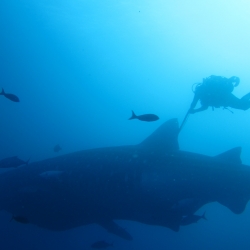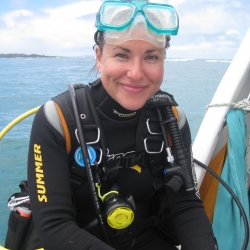Program of Study: Natural Resources Conservation, Global Perspectives Major
Country of Exchange: Galapagos Islands
Tags: Marine BiologyScuba DivingWildlife
Where did you do your internship?
I completed an internship at the Galapagos National Park and Marine Reserve on the Galapagos Islands in the Pacific Ocean. Because I am so keen on marine resources and already had numerous scuba certifications, I wanted to work in an area where I would get exposure to both. I looked at the park website and found the Department of Applied Marine Research with a contact name. I emailed, told them who I was, and what I was studying, and that I was interested in volunteering. They asked me to submit my CV and a volunteer application, and voilà…(!) six weeks later I received an official acceptance letter by email.
What did your job entail?
My job entailed some wildlife surveys, in this case, juvenile lobster, and oceanographic monitoring with a CTD device. To monitor lobsters using scuba gear, we go underwater to remove a lobster aggregating device (basically a big algae encrusted float that looks like a seaweed blob) from the ocean floor, find the lobsters inside, take various measurements, and release them. I also got to assist with another project that was tagging juvenile black-tip sharks, Carcharhinus limbatus, to study their site affinity and population abundance while they are rearing in coastal mangrove areas.

What was the highlight of your international experience?
Tagging whale sharks near Darwin Island…! I was incredibly fortunate enough to find myself on a joint expedition between the Galapagos Whale Shark Project, Conservation International, and the Charles Darwin Research Center as a support diver. Rhincodon typus, or the whale shark, is a poorly understood species, not much is known of their life history, mating, or migration patterns among many other things. However, this is an IUCN Red Listed species (‘Vulnerable’ with declining population trend), and so to understand how to conserve this species better, we need to understand more about it. The team of world-renowned scientist and conservationists tagged 14 sharks over the 8 day expedition with satellite tags that transmit the shark’s location to the ARGOS satellite in real time.
Oh yeah… a school of hammerhead sharks passed amongst us one day while diving. That was pretty awesome too!
Aspirations for the future
I am going to start a Master’s degree at the UBC Fisheries Center in the fall of 2012. I believe the over-exploitation of our oceans has received little attention in the past, and would like to research ways to move towards a sustainable future when it comes to our oceans and the marine life they contain. When I’m finished that, I’d like to work in some far flung corner of the world helping local communities to establish healthy marine protected areas in conjunction with sustainable fishing practices.
